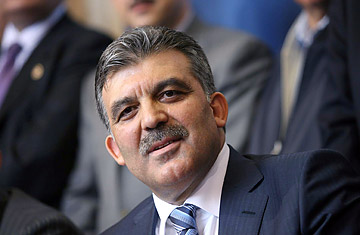
Turkish Foreign Minister Abdullah Gul addresses the media, May 6, 2007. Gul withdrew his candidacy for Turkey's Presidency on Sunday.
Those elections promise to be closely fought. Legions of AKP volunteers have already begun canvassing door-to-door to get out the vote. And in a major political realignment unlike anything Turkey has seen in 30 years, the country's two main right-wing opposition parties this weekend joined forces under a single banner. The two main left-wing parties did the same, whittling down a five-way race to three. But while secularist opposition parties are trying to consolidate opposition to the AKP, the effect may be the opposite: There will be fewer parties on the ballot, but the faces that represent them are the same. Deniz Baykal, the leader of the left wing secularist People's Republican Party (CHP), for one, remains unpopular even with the rank and file of his own party.
Gul and the AKP leadership are, in fact, confident that they can strengthen their mandate at polls to the point that they can elect the President of their choice regardless of the opposition's preferences. (It remains unclear whether Gul will run again.) The AKP currently holds 352 out of 550 seats in parliament; it's too early to predict whether they'll succeed in winning the additional 15 required to give them a two-thirds majority. Meanwhile, the party also wants to amend the constitution to prevent the sort of legal obstructionism used by the opposition to block Gul's candidacy: According to the proposal, which was passed by a parliamentary committee last weekend, Turkey's President would in the future be directly elected by voters, rather than chosen by the parliament. But such a change also requires a two-thirds majority in the parliament, and Turkey's secularist opposition is obviously staunchly opposed, making passage difficult for now.
The early election will be one of the first held in Turkey's hot mid-summer months. (It's scheduled for July 22, although it could be held up to one month earlier.) At that time of year, Turks usually head down to the Aegean or Mediterranean to cool off. Gul himself could use the rest; he was reportedly treated for high blood pressure last week. But this year is going to be different. With so much at stake in the vote, most Turks — and especially the politicians — may stay home and sweat it out.
